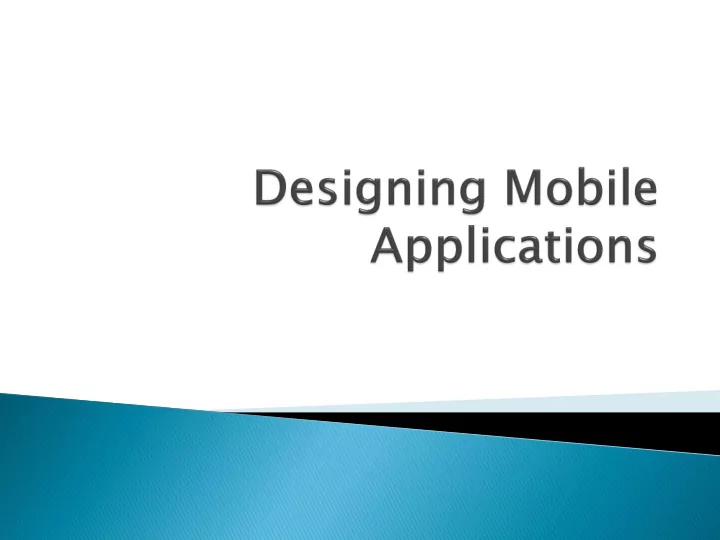

<head> <style type="text/css" media="screen">@import "../jqt/jqtouch.css";<style> <style type="text/css" media="screen">@import "../jqt/theme.css";</style> <script src="../jquery.js" type="text/javascript" charset="utf-8"></script> <script src="../jqt/jqtouch.js" type="text/javascript" charset="utf- 8"><script> <script type="text/javascript" charset="utf-8"> var jQT = new $.jQTouch(); </script> </head>
<div id="example" class="current"> <ul class="rounded"> <li><a href="#one">Page 1</a> <li><a href="#two">Page 2</a> </ul> </div> <div id="one"> <div class="toolbar"> <h1>Page 1</h1> <a class="back">Back</a> </div>This is page one. </div> <div id="two"> <ul> <li>This is another page. <a href="#two">go to page 1?</a></li> </ul> </div>
Add divs to your page with meaningful IDs Set up links to those ids with anchors inside LIs: ◦ <ul><li><a href="#yourid">your link</ a></li></ul> jQTouch handles the animations target=_blank on external links
Just specify a URL instead of a hash
<div id="example" class="current"> <ul class="rounded"> <li><a href="#one">Page 1</a> <li><a href="jqtouch-loadme.html">Page 2</a> </ul> </div> <div id="one">This is page one. </div>
var jQT = new $.jQTouch({ statusBar: 'black', icon: 'cs.png', addGlossToIcon: true, // defaults to true startUpScreen : ’my - start.png’ });
Change class of <ul> Default theme options: rounded, edgetoedge, plastic, metal
Include basic jqtouch.css Optionally include theme.css Add your own styles by overwriting Use Web Browser tools to check what styles are active
Specify class on your <a> link
slide slideup dissolve fade flippop swap cube
<div id="example"> <ul class="rounded"> <li><a class="flip" href="#one">Page 1</a> <li><a class="swap" href="#two">Page 2</a> </ul> </div>
jQuery will set an “active” class on touch&hover for anything with a ".touch" class Will take off the active class if the touch ends up not being a tap (if you move your finger) And if you swipe sideways, will fire .swipe
<script type="text/javascript" charset="utf-8"> var jQT = new $.jQTouch({}); $(document).ready(function(){ $(".touch").swipe(function(){ alert("SWIPE"); }) $(".touch").bind("touchstart", function(){ $(".touch").unselect(); }) }) </script>... <div id="example"> <div class="touch cta">Touch this.</div> <div class="touch cta">Or touch that.</div> </div>
navigator.geolocation.getCurrentPosition (callback)
navigator.geolocation.getCurrentPosition(handlePosition) function handlePosition(position) { $("#lat").html(position.coords.latitude); $("#lon").html(position.coords.longitude); }
// event name: orientationchange // using jQuery: $("body').bind("orientationchange", function(event) { react() }
Recommend
More recommend